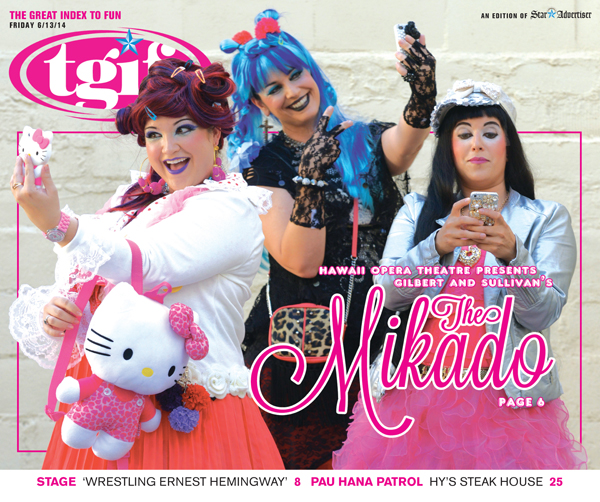
HOT’s The Mikado Opens This Weekend!
Fanciful visions of Asia have proved to be good fodder for opera, from “Turandot” to “Madama Butterfly.” Something about that ancient culture and its arcane formality have inspired composers and enchanted audiences for generations.
But Hawaii Opera Theatre’s new production of “The Mikado,” which premieres this week, brings a modern twist to Gilbert and Sullivan’s satiric tale of romance under the rule of the absurd.
The operetta is getting a hip, urban look, Japan-style, courtesy of Anne Namba, fashion designer and costume designer of the show.
Namba makes a buying trip to Japan every year, and last year she was struck by street fashion and how it came to represent different groups of people there.
“I thought it would be great to do those modern-day stereotypes for ‘The Mikado,’” she said. “It is a spoof, and it is this slapstick comedy, but it was written back in 1878, and what was funny back then is not really politically correct today — and it’s not funny. You kind of cringe. But if you take it into modern-day stereotypes, because Japan has such wonderful stereotypes, everyone will appreciate it more, and it will be funny.”
Productions of “The Mikado” usually re-create, in an exaggerated way, a vision of traditional Japanese culture. Women dress like geisha in colorful kimonos, their hair tightly bound into a pomade-impregnated fanlike haircut. Men range from samurai-style to high officials in ornate gowns and beanie-type hats. (One peculiar production, however, had the characters dressed in 1920s English attire, with men in tuxedos pulling up the corner of their eyes when they sang “we are gentlemen of Japan.”)
Namba has been the costume designer for several HOT productions but found this show to be her most difficult yet.
“Trying to translate into the costumes was a challenge,” Namba said. For example she said, “I have a Caucasian choir member trying to dress like a Japanese tourist who dresses like a Caucasian.”
In this production, the character of the Mikado (Jamie Offenbach) is drawn from anime, dressed in shiny silver and jet black.
Gone are the geisha, replaced by Harajuku Girls, named for the tony district in Tokyo where young women have turned the idea of fashion coordination on its head.
Namba’s research revealed a surprising sophistication to the unusual style.
“I just thought it’s crazy looks, but there’s actually different categories of Harajuku girls,” she said. “It’s very well thought out, how you put things together.”
For some of the men, Namba chose a kitschy gangster mode.
“How do you do yakuza, other than they’re tattooed and you cut off a finger?” she asked rhetorically. “And so I took the approach of trying to make them look like mafia, kind of thuggish, but tacky.”
Although Hawaii has such familiarity with Japan, Namba worried that there will still be things that might get lost in translation.
“Comedy is hard,” she said. “It’s hard to define what is funny.
“(In Japan), they have these airplane-director types (directing traffic) and they’re always going ‘arriii, arriii, arriii, stoppu!’ And what they’re saying is ‘all right, all right, all right’ in a Japanese accent. I thought it would be so funny to have it in the show directing the taiko drummer as they push the stage in.
“You won’t get that if you don’t go to Japan. But then again, you might just think it’s funny that he’s being directed in with airplane paddles.”
Henry Akina, HOT artistic director who is directing the show, embraced Namba’s vision, thinking an updated version will play on the same sensibilities today as it did 140 years ago.
The story satirizes Victorian preoccupations with mores and propriety; rules dictate everything from love to death, yet characters manage to bend them to their convenience.
“The rules are as fluid as we know them today and as manipulable as we know them today,” Akina said.
Akina is especially enthusiastic about his cast, calling it “one of the most intelligent casts I’ve ever worked with at HOT.”
In addition to island favorite Offenbach, the cast includes baritone Curt Olds as Koko, a baseball-bat wielding executioner dressed in tiger hide; Victoria Livengood as Katisha, wearing Chanel; University of Hawaii professor John Mount as Pooh-Bah; and baritone Leon Williams as Pish-Tush.
The romantic pair of Nanki-Poo and Yum-Yum will be portrayed by an actual couple — tenor Joshua Kohl, who performed in last season’s “Dialogues of the Carmelites,” and his wife, soprano Sarah Asmar, making her HOT debut.
Kohl played Nanki-Poo in a traditional production in Kansas City last year, but in this production Nanki-Poo is a “salariman” in disguise. Like his wife, he is a “big Gilbert and Sullivan fan,” and he said he expects the witty repartee of their work to be a snappy treat.
“It’s a brilliant show,” he said. “There’s quite a bit of dialogue in the show.
“I think Henry did a very, very good job of putting together not only a cast of very good singers, but also people who understand the pace and dialogue and everything. That’s not always an easy thing to do. You have these great musical numbers, then you have to collect them with this dialogue.”
Asmar will be dressed as a Harajuku Girl, sporting a frothy pink dress and white heels with gold wingtips. She’ll flitter on stage for the first time with two other Harajuku Girls to sing the bouncy melody “Three Little Maids,” which suits her just fine.
“In any Gilbert and Sullivan that you give me, I will find my favorite parts in the ensemble,” she said. “The interplay, the character that they bring to them, the play that they bring to them, I just love them.”
Her character “cares a lot about herself,” she said with a laugh. “She cares a lot about what she looks like … She’s a little self-centered.”
Hawaii audiences will easily relate to the cavalcade of tourists, marathon runners, karate experts and other Japanese archetypes who will make their appearance on stage.
“I think that is a unique take on ‘The Mikado,’ and a very unique take on Japan,” Akina said, “so we might as well call a spade a spade and say this could only happen in Hawaii.”
‘THE MIKADO’
Presented by Hawaii Opera Theatre» Where: Blaisdell Concert Hall, 777 Ward Ave. |
From www.HonoluluPulse.com / Article written by Steven Mark

